032018_YKBP_A8.pdf







8 Broadcaster Press
March 20, 2018 www.broadcasteronline.com
National
Ag Week
March 19-23, 2018
Thank A Farmer Today!
Road Salt & Water Quality: Growing SDSU Animal Science
Concern in Some Northern States Department Presents
by SDSU iGrow
BROOKINGS, S.D. - While road
salt throughout the winter months
is seen by most as a necessity in
our part of the country, it can come
at a cost, said David Kringen, SDSU
Extension Water Resources Field
Specialist.
"While the salination of South
Dakota surface waters is not a water
quality concern at this time, awareness of the issue could prevent it
from being a concern in the future,"
Kringen said.
He explained that salt corrosion
can not only cause damage to our
infrastructure (roads and bridges)
and vehicles, it can be harmful to
our freshwater ecosystems as well.
Salination (or salinization), is the
process where water-soluble salts
accumulate in soils, or a body of
water. It is typically measured by
an increase in chloride, which is
an anion of many salts (i.e. sodium
chloride, magnesium chloride).
In soils, salination is a concern,
Kringen explained, because excess
salts hinder the growth of crops by
limiting their ability to take up water.
"In freshwater ecosystems,
increased salinity can significantly
reduce both species richness (the
number of species found in an
ecosystem) and relative abundance
(the abundance of a given species
relative to the abundances of the
other species) of aquatic plants and
invertebrates; which in turn, affects
the entire food chain," he said.
Measuring Salinity
Salinity ranges, measured as a
concentration (milligrams per liter),
are categorized as fresh to highly
saline and can be seen in the table.
The U.S. Environmental Protection Agency's nationally-recommended criteria for chronic (long-term)
chloride toxicity exposure for freshwater aquatic life is 230 milligrams
per liter.
In South Dakota, surface waters
designated as coldwater permanent
fish life propagation waters are assigned a numeric standard of 100
milligrams per liter for a 30-day average and 175 milligrams per liter for a
daily maximum.
"Concentrations above these limits means the water body does not
support the beneficial use assigned
to it," Kringen said.
For surface waters
designated
as a domestic water
supply,
the 30-day
average and
daily maximum concentrations are
250 milligrams per liter and 438 milligrams per liter respectively.
What research shows
A recent study conducted in 2017
investigated long-term chloride
trends in 371 freshwater lakes in
North America. "Results indicated
that the density of roads and other
impervious land cover was a strong
predictor of long-term salination
in Northeast and upper Midwest
lakes where the study was focused,"
Kringen said.
Other studies also recognize the
link between the salination of water
bodies with the application of road
salts as metropolitan areas continue
to develop and grow.
"Keep in mind, runoff that enters
city storm sewer systems to be channeled away is discharged untreated
and delivered directly to rivers and
streams; rivers and streams that we
use for domestic, commercial and
recreational purposes," he said.
Research at Midwest
Section Animal
Science Meeting
by SDSU iGrow
BROOKINGS, S.D. - South Dakota State University
swine researchers from the Department of Animal Science will present seven research abstracts at the Midwest Section meeting of the American Society of Animal
Science (ASAS) and American Dairy Science Association
(ADSA) meeting Omaha, Nebraska, from March 12-14,
2018.
The Department of Animal Science opened the new
South Dakota State University Swine Education and
Research Facility on Oct. 1, 2016. The first anniversary of
the grand opening of the new SDSU Swine Education and
Research Facility and Wean-to-Finish Research Barn was
celebrated with an inaugural SDSU Swine Day on Oct 11,
2017, in Brookings, SD.
"The new swine facilities have opened up many new
opportunities for our students and researchers," says Joe
Cassady, SDSU Animal Science Department Head." The
swine industry has and will continue to change and SDSU
is now in a great place to be a leader in research, extension, and teaching."
SDSU swine researchers will present the following
research at this year's Midwest ASAS meeting:
• Efficiency of Utilizing Standardized Ileal Digestible
Lysine for Whole Body Protein Retention in Pregnant
Gilts during Early, Mid, and Late Gestation. R. A. S. Navales, B. C. Thaler, and C. L. Levesque, South Dakota State
University, Brookings.
• Effect of Essential Oil Supplementation to Lactation
Diets on Reproductive Performance and Fecal Characteristics of Sows. K. Fuoss1, M. D. Lindemann2, and C. L.
Levesque1, 1South Dakota State University, Brookings,
2University of Kentucky, Lexington.
•
Immunological Response of Pigs by Lymphocyte
Proliferation by the Supplementation of Beta-Glucans.
ued growth domestically and globally
H. Kerkaert, J. Koepke, C. L. Levesque, and B. C. Thaler,
shows that consumers trust the curSouth Dakota State University, Brookings.
rent approach that balances consumer
• Growth Performance, Organ Weights, and Blood
expectations and the needs of organic Parameters of Nursery Pigs Fed Diets Containing Coldproducers and handlers.”
Pressed Canola Cake. J. W. Lee and T. A. Woyengo, South
According to USDA reports for 2017, Dakota State University, Brookings.
the number of certified organic operaResearch posters to be presented at this year's meettions increased domestically by seven ing:
percent and globally by 11 percent.
• Floor Space Allocation Effects on Heavy-Weight FinIndustry estimates show that organic
ishing Pigs (over One Hundred Thirty-Five Kilograms). R.
sales in the United States reached
S. Samuel, B. C. Thaler, C. L. Levesque, and J. Darrington,
almost $47 billion in 2016, reflecting
South Dakota State University, Brookings.
an increase of almost $3.7 billion since
• Nutrient Digestibility of Heat- or Heat plus Citric
2015.
Acid-Pretreated Distiller's Dried Grains with Solubles for
The Department carefully considPigs. C. Zangaro and T. A. Woyengo, South Dakota State
ered public comments and the relative University, Brookings.
costs and benefits for both producers
• Comparative Analysis of Bacterial Composition in
and consumers of imposing the prothe Ileum of Weaned Pigs Fed Microbially Enhanced Soyposed additional regulations.
bean Meal as a Potential Ingredient Replacement in ConMore information on the OLPP final ventional Weaning Diets. J. L. Ortman, B. St-Pierre, and C.
rule is available in the March 12, 2018, L. Levesque, South Dakota State University, Brookings.
Federal Register, and on the USDA NaFor more information, contact Ryan Samuel, Assistant
tional Organic Program web page.
Professor and SDSU Extension Swine Nutrition Specialist,
at 605.688.5431.
USDA Decides Not to Impose Additional Regulatory
Requirements for Organic Producers and Handlers
Significant policy and legal issues
were identified after the rule published
in January 2017. After careful review
and two rounds of public comment,
USDA has determined that the rule
exceeds the Department’s statutory authority, and that the changes to the existing organic regulations could have a
negative effect on voluntary participation in the National Organic Program,
including real costs for producers and
consumers.
“The existing
robust organic
livestock and
poultry regulations are effective,” said USDA
Marketing and
We Carry
Regulatory Program Undersecretary Greg Ibach.
“The organic
Princeton • Vermillion, SD 57069
industry’s contin-
USDA Press
WASHINGTON, March 12, 2018 —
The U.S. Department of Agriculture
(USDA) today announced the decision
to withdraw the Organic Livestock and
Poultry Practices (OLPP) final rule
published on January 19, 2017. The
rule would have increased federal regulation of livestock and poultry for certified organic producers and handlers.
The withdrawal becomes effective May
13, 2018.
Gates Hydraulic Hoses
1114
605-202-7231
V E R M I L L I O N FO R D
understands the value of agriculture.
This week we recognize and celebrate
its abundance.
Tractor Supply Company is the largest operator of rural
lifestyle retail stores in America. Founded in 1938 as a mail
order tractor parts business, Tractor Supply Company (also
referred to as TSC) owns and operates over 1,600 stores in
49 states supplying a niche market for farmers, horse owners,
ranchers, part-time and hobby farmers, and suburban and
rural homeowners, as well as contractors and tradesmen.
TSC's products include: clothing, equine and pet supplies,
tractor/trailer parts and accessories, lawn and garden
supplies, sprinkler/irrigation parts, power tools, fencing,
welding and pump supplies, riding mowers and more.
Stop in today to your local TSC at 509 W. Cherry St. Vermillion
605-624-4000
Get your ad in the..
Classifieds
Today!
CALL
101 W Cherry St • Vermillion, SD
HOXENG CROP INSURANCE LLC
For Your Crop Insurance Needs
MPCI & Crop Hail
36 years of crop insurance experience
Dave Hoxeng • Tyler Hoxeng
44867 303rd St. • Volin, SD 57072
O?ce: 605-267-2767 • 1-855-969-2767
Dave’s Cell: 605-661-1136 • Tyler’s Cell: 605-661-7241
We are an Equal Opportunity Employer
624-4429
•••
FAX
624-2696
•••
EMAIL
classifieds@plaintalk.net
•••
ONLINE
BroadcasterOnline.com
•••
DROP BY
201 W. Cherry, Vermillion


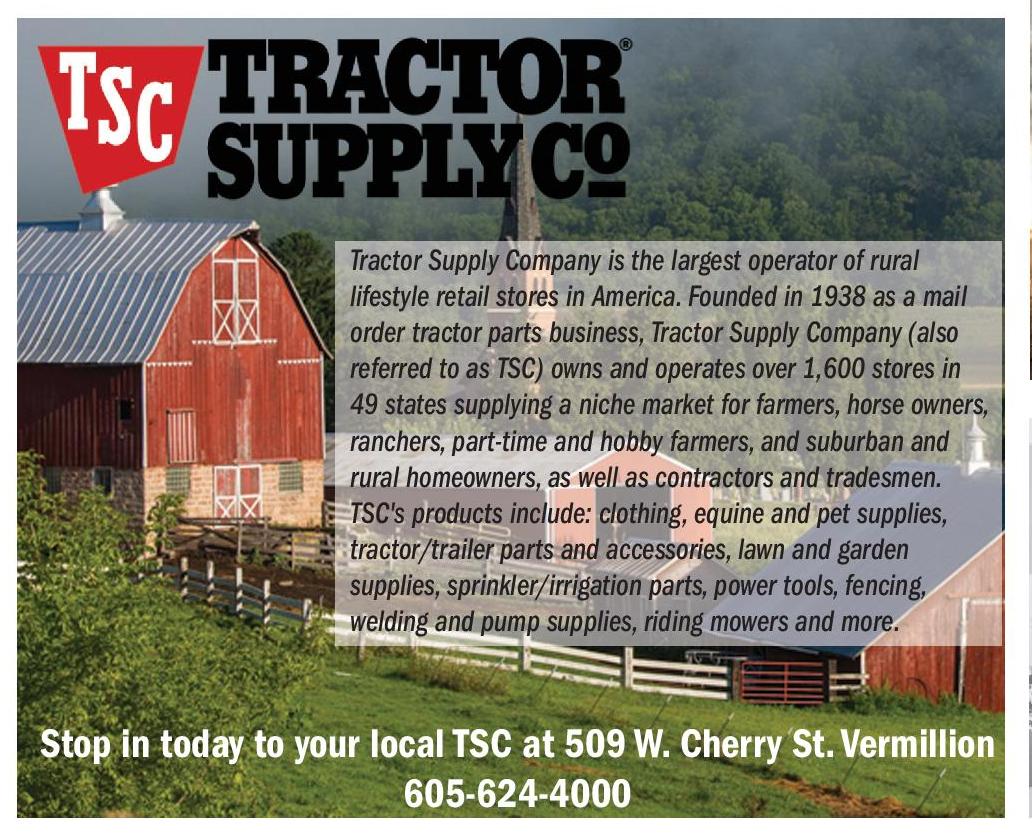

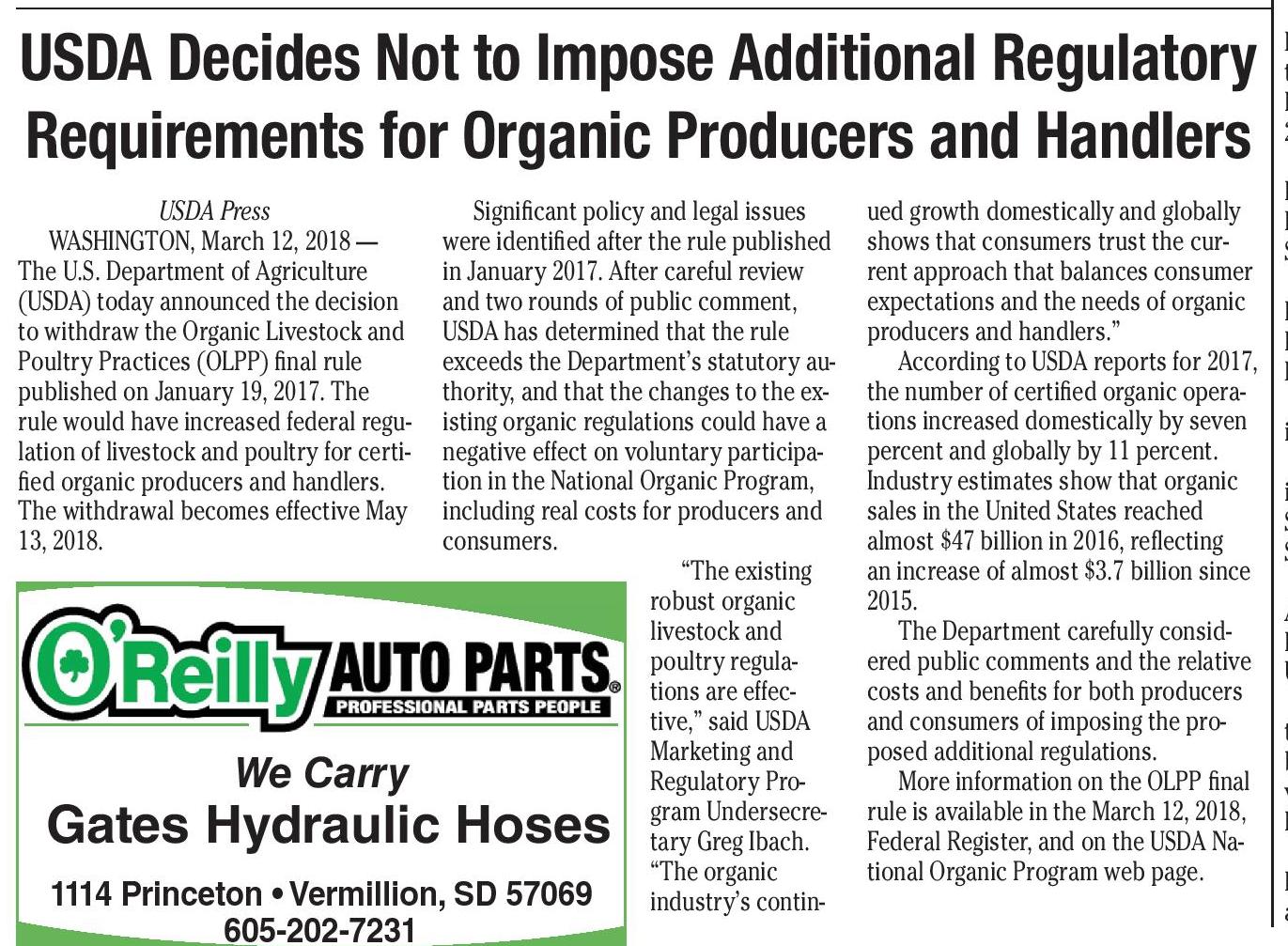




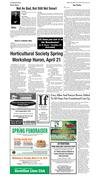
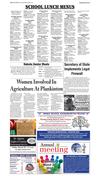




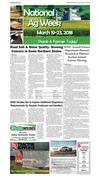
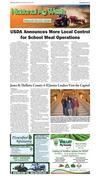

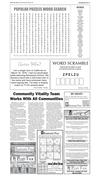
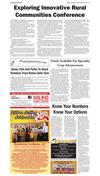
 Previous Page
Previous Page






